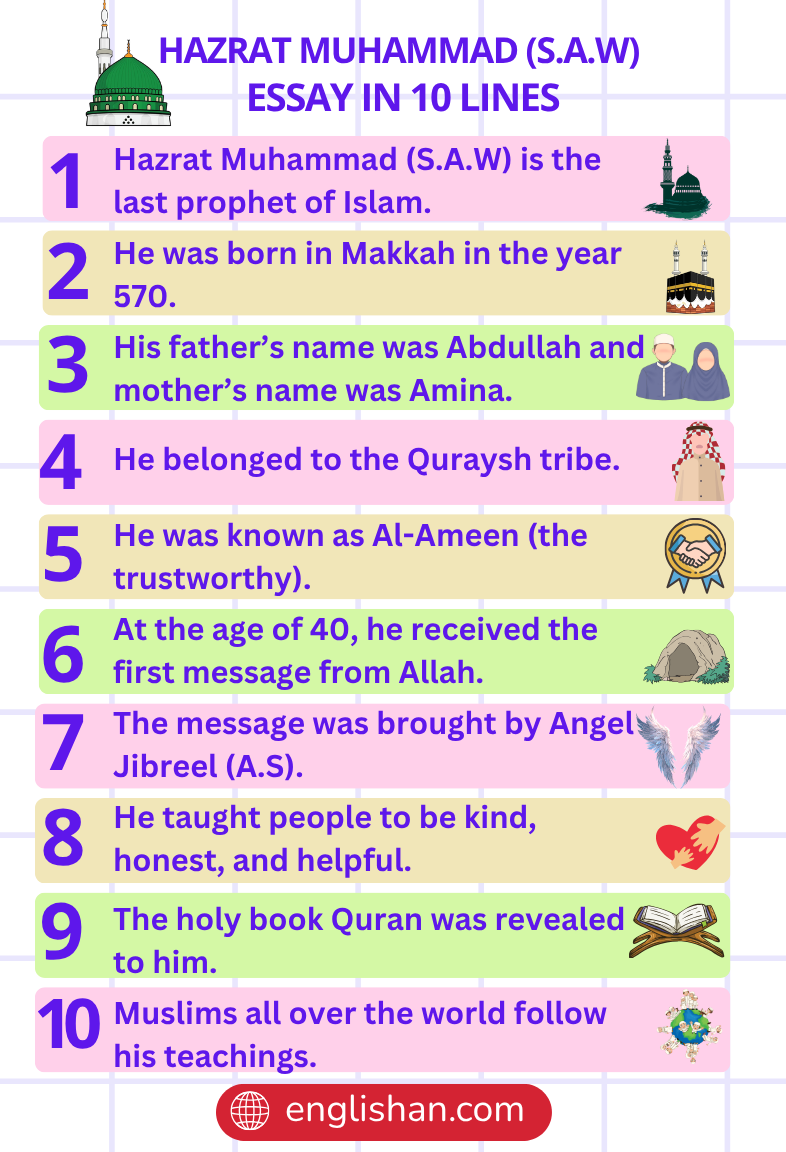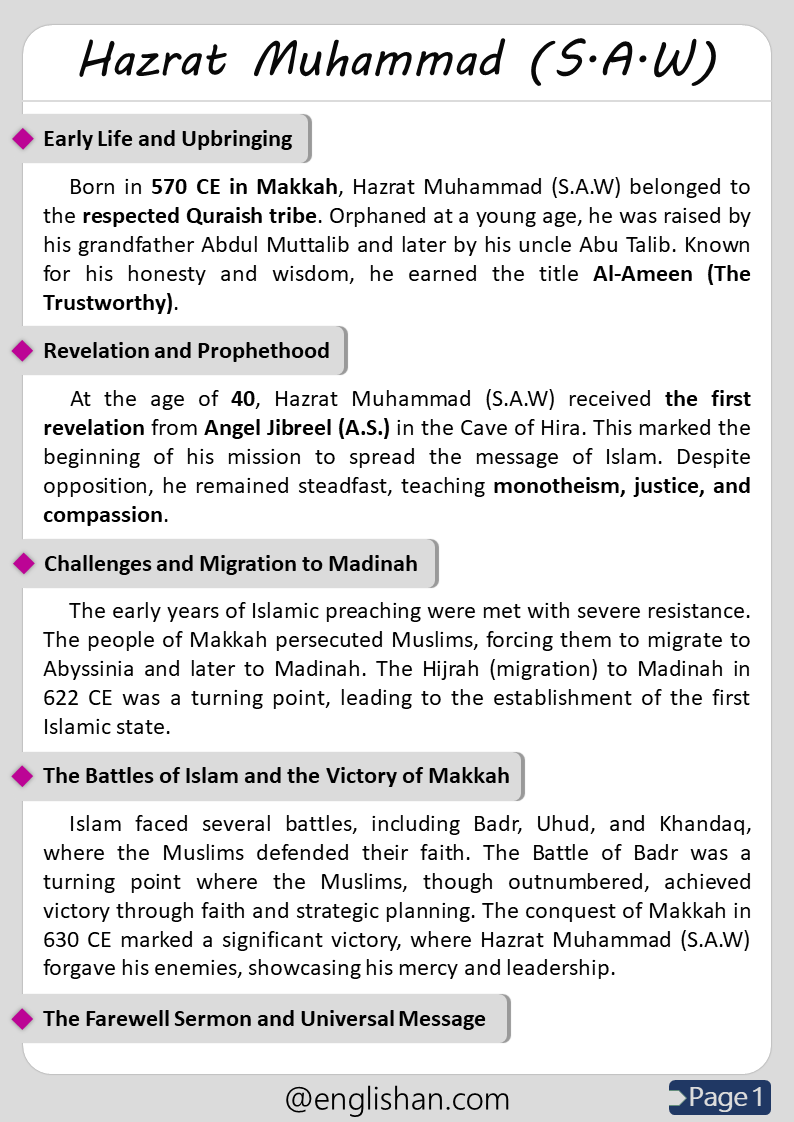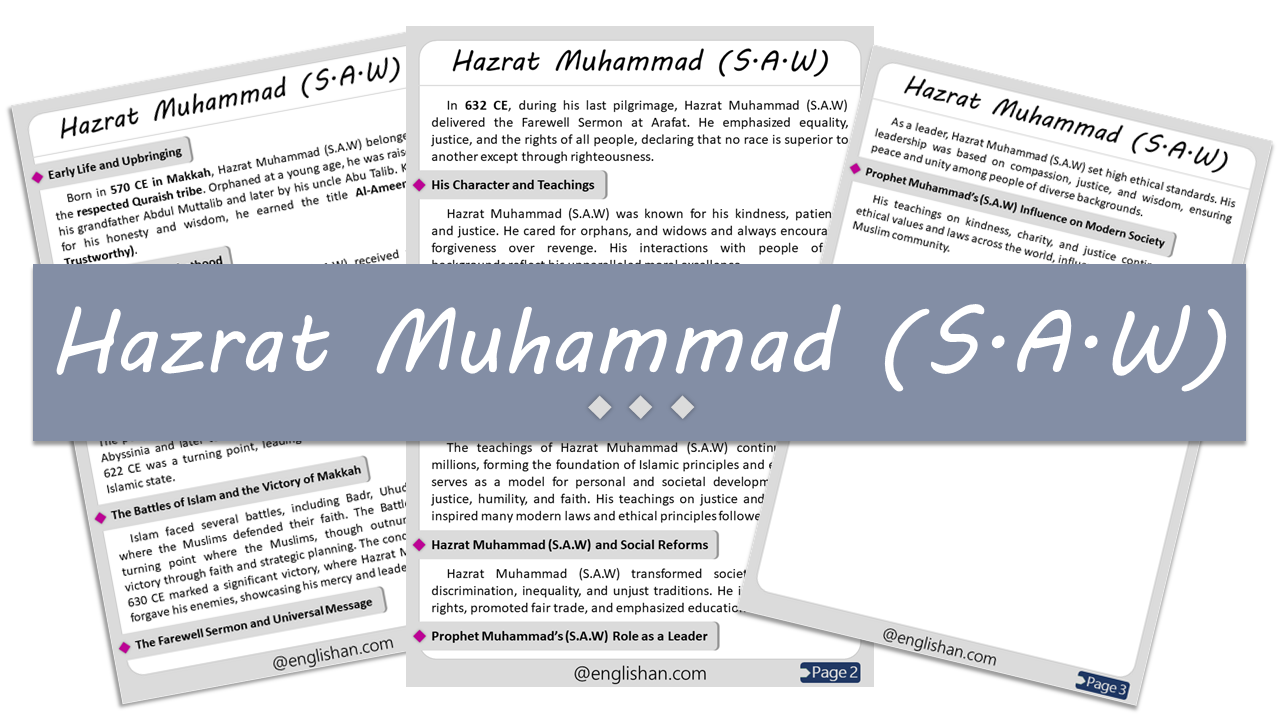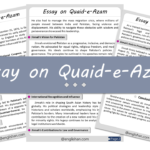When writing about Hazrat Muhammad (S.A.W), it’s important to understand his life, teachings, and the values he brought to the world. This essay on Hazrat Muhammad (S.A.W) highlights his early life, message of peace, patience, honesty, and the significance of the Quran. It is written in 500 words to help students with homework or exams. You can download this essay as a free PDF or image to study or print.
10 Lines Hazrat Muhammad (S.A.W) Essay for Class 2 to Class 5
- Hazrat Muhammad (S.A.W) is the last prophet of Islam.
- He was born in Makkah in the year 570.
- His father’s name was Abdullah and mother’s name was Amina.
- He belonged to the Quraysh tribe.
- He was known as Al-Ameen (the trustworthy).
- At the age of 40, he received the first message from Allah.
- The message was brought by Angel Jibreel (A.S).
- He taught people to be kind, honest, and helpful.
- The holy book Quran was revealed to him.
- Muslims all over the world follow his teachings.

250 Words Essay on Hazrat Muhammad (S.A.W) for Middle School
Hazrat Muhammad (S.A.W), the last prophet of Islam, was born in Makkah in 570 A.D. He belonged to the respected tribe of Quraysh. His father’s name was Abdullah and his mother’s name was Amina. Sadly, he lost both parents at an early age and was raised by his grandfather and later his uncle.
He was known for his honesty and truthfulness, earning the title of Al-Ameen, which means “the trustworthy.” At the age of 40, he received the first revelation from Allah through Angel Jibreel (A.S) while meditating in the Cave of Hira.
The teachings of Hazrat Muhammad (S.A.W) focused on kindness, honesty, patience, and belief in one God. He called people to worship only Allah and to leave bad habits such as lying, cheating, and hurting others. His message spread peace, justice, and brotherhood.
He faced many challenges while spreading Islam, but he remained patient and never gave up. The holy book Quran was revealed to him over 23 years, which is the main source of guidance for Muslims.
Hazrat Muhammad (S.A.W) passed away at the age of 63 in Madinah. His life is a role model for everyone. Muslims around the world love him deeply and follow his teachings.
500 Words Hazrat Muhammad (S.A.W) Essay for Upper Primary and Lower Secondary
Early Life and Upbringing
Born in 570 CE in Makkah, Hazrat Muhammad (S.A.W) belonged to the respected Quraish tribe. Orphaned at a young age, he was raised by his grandfather Abdul Muttalib and later by his uncle Abu Talib. Known for his honesty and wisdom, he earned the title Al-Ameen (The Trustworthy).
Revelation and Prophethood
At the age of 40, Hazrat Muhammad (S.A.W) received the first revelation from Angel Jibreel (A.S.) in the Cave of Hira. This marked the beginning of his mission to spread the message of Islam. Despite opposition, he remained steadfast, teaching monotheism, justice, and compassion.
Challenges and Migration to Madinah
The early years of Islamic preaching were met with severe resistance. The people of Makkah persecuted Muslims, forcing them to migrate to Abyssinia and later to Madinah. The Hijrah (migration) to Madinah in 622 CE was a turning point, leading to the establishment of the first Islamic state.
The Battles of Islam and the Victory of Makkah
Islam faced several battles, including Badr, Uhud, and Khandaq, where the Muslims defended their faith. The Battle of Badr was a turning point where the Muslims, though outnumbered, achieved victory through faith and strategic planning. The conquest of Makkah in 630 CE marked a significant victory, where Hazrat Muhammad (S.A.W) forgave his enemies, showcasing his mercy and leadership.
The Farewell Sermon and Universal Message
In 632 CE, during his last pilgrimage, Hazrat Muhammad (S.A.W) delivered the Farewell Sermon at Arafat. He emphasized equality, justice, and the rights of all people, declaring that no race is superior to another except through righteousness.
His Character and Teachings
Hazrat Muhammad (S.A.W) was known for his kindness, patience, and justice. He cared for orphans, and widows and always encouraged forgiveness over revenge. His interactions with people of all backgrounds reflect his unparalleled moral excellence.
Stories of Kindness and Forgiveness
One of the most well-known examples of his mercy is the Story of Ta’if. When the people of Ta’if rejected him and threw stones, he refused to curse them and instead prayed for their guidance. His ability to show patience and compassion even in the face of cruelty demonstrates his extraordinary character.
Impact and Legacy
The teachings of Hazrat Muhammad (S.A.W) continue to guide millions, forming the foundation of Islamic principles and ethics. His life serves as a model for personal and societal development, inspiring justice, humility, and faith. His teachings on justice and human rights inspired many modern laws and ethical principles followed worldwide.
Hazrat Muhammad (S.A.W) and Social Reforms
Hazrat Muhammad (S.A.W) transformed society by abolishing discrimination, inequality, and unjust traditions. He improved women’s rights, promoted fair trade, and emphasized education for all.
Prophet Muhammad’s (S.A.W) Role as a Leader
As a leader, Hazrat Muhammad (S.A.W) set high ethical standards. His leadership was based on compassion, justice, and wisdom, ensuring peace and unity among people of diverse backgrounds.
Prophet Muhammad’s (S.A.W) Influence on Modern Society
His teachings on kindness, charity, and justice continue to shape ethical values and laws across the world, influencing millions beyond the Muslim community.
Conclusion
Hazrat Muhammad (S.A.W) is a beacon of light for humanity. His entire life was dedicated to establishing justice, spreading knowledge, and uplifting the oppressed. His unwavering patience in adversity, his boundless mercy, and his commitment to truth serve as an eternal source of inspiration. The legacy he left behind continues to shape the lives of people worldwide, offering a timeless guide to righteousness, peace, and ethical living.

Difficult Words Used in 500 Hazrat Muhammad (S.A.W) Essay
| Word | Meaning |
|---|---|
| Revelation | A divine message from Allah |
| Persecution | Harsh treatment due to religious beliefs |
| Monotheism | Belief in one God |
| Conquest | The act of taking control over a place |
| Pilgrimage | A religious journey to a sacred place |
Hazrat Muhammad (S.A.W) Essay PDF
You May Also Like






